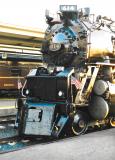
| Home | Open Account | Help | 324 users online |
|
Member Login
Discussion
Media SharingHostingLibrarySite Info |
Steam & Excursion > Front End Friday, Steam Edition: 614 in 1998Date: 03/22/24 05:28 Front End Friday, Steam Edition: 614 in 1998 Author: bandob Ditch lights are evident now in this photo of 614 in Hoboken prior to one of the excursions to Port Jervis.
B&O Bill  Date: 03/22/24 06:29 Re: Front End Friday, Steam Edition: 614 in 1998 Author: refarkas Great front-end portrait.
Bob Date: 03/22/24 07:28 Re: Front End Friday, Steam Edition: 614 in 1998 Author: ClubCar Thanks Bill for the photo. I know that many steam purists hate the ditch lights, but I personally like them and welcome them on all steam engines if it means that they can operate on main lines with the class one railroads. This is far better than being out-of-service in a museum yard collecting rust, sad to say.
John in White Marsh, Maryland Date: 03/22/24 10:05 Re: Front End Friday, Steam Edition: 614 in 1998 Author: LarryDoyle C&O 614 is excepted from the FRA requirement for ditch lights, 49 CFR 229.125(h).
-LD Date: 03/22/24 10:37 Re: Front End Friday, Steam Edition: 614 in 1998 Author: wcamp1472 They are a NJ Transit addition,
The FRA Steam Loco Rules are not changed to require "Ditch Lights". To me they enhance the appearance on this locomotive. Gives a certain 'determined' look, and a 'stand-back' attitude. Its a fine performer and revels in hauling a long string of passenger cars. A big contribution to burning a thin, hot firebed is the use of individual "finger" grate bars, shared by RDG 2100s & NKP Berks. A superheated screamer! W. ( Superheating the steam ensures that a short-duration steam charge maintains expansive forces all the way down the power stroke, even at very short cut-offs. She can put superheated steam up the stack, when pulling a good load, at high speed. In 'Saturated' steam engines, the steam arrives at the cylinders with a temperature below boiler water, and it's expansive pressure is depleted after 20% of the power stroke. So, it requires the use of longer valve cut-offs, and greater quantities of steam & water. Superheated engines do require a high-draft rate ( through the firebed) "warm-up period" before the refractory-brick arch gets to a glowing state - -- about 15 minutes of steady pounding, after a cold start. A thin firebed and a steady draft generates about 3,000 F flame temperatures, enough to soften and melt the flame-exposed surfaces of the firebricks! The secret to firing a hot firebed is generous Oxygen supplies,: only about 20% of the air flow is useable Oxygen, 80% is inert Nitrogen. If you're 'behind' in boiler pressure, it's a sign of oxygen-starvation, panic-adding of more stoker-fed coal, only lowers flame temps --- because the added fuel must be heated to the gaseous-state before oxygen supplied, carbon-reduction temperatures are reached. You can either heat the water or heat the the fuel, it's hard to do both at the same time --- that's where a good fireman shows his mettle, With a strong draft, 90% of the fine coal is burned in mid-air, before diving into the flues, surrounded by 'cold' water. Wind velocities over the firebox's brick-arch are over 100mph! Black smoke is the surest sign of a 'cold' firebox, Coal or Oil fired ....). Edited 4 time(s). Last edit at 03/22/24 11:45 by wcamp1472. Date: 03/22/24 12:03 Re: Front End Friday, Steam Edition: 614 in 1998 Author: co614 We added the ditch lights as our way of doing all possible to minimize grade crossing accidents. Operation Lifesaver found that locomotives equipped with working ditch lights were involved in 55% fewer grade crossing incidents than those without ditch lights. We carried leather hoods to go over the ditch lights at photo runbys so as to not ruin the front ends appearance for the runbys.
Great memories. Thanks, Ross Rowland |